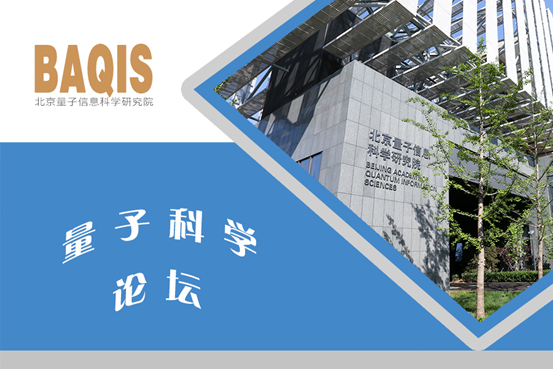BAQIS Quantum Science Forum 62: Uncover the mystery of strange metal state in correlated electron systems
2022/01/05

Time:Jan. 5, 2022, 10:00-11:00
Zoom Meeting ID: 775 921 8510 (Passcode: Quantum)
Title:Uncover the mystery of strange metal state in correlated electron systems
Host:Dong Liu, Research Scientist, BAQIS, Associate Professor, Tsinghua University.
Abstract:Over the recent decades, there has been growing experimental evidences in correlated electron systems of which thermodynamic and transport properties violate the Landau’s Fermi liquid paradigm for metals. These non-Fermi liquid behaviors, ranging from unconventional superconductors, heavy-fermion metals and superconductors, magic-angle twisted bi-layered graphene, to Kondo quantum dots, often exist close to a magnetic quantum phase transition and exhibit so-called “strange metal (SM)” phenomena: with (quasi-)linear-in-temperature resistivity and singular logarithmic-in-temperature specific heat coefficient. In spite of the ubiquitous presence of SM features in experiments across a wide range of materials, the microscopic origin of them is largely un-explained, and it has become an outstanding open problem in correlated electron systems. In this talk, I first take an overview of the SM phenomena. I further offer a microscopic mechanism to uncover this mystery seen in quasi-two-dimensional heavy-fermion metals [1] and superconductors [2]. This mechanism is based on coexistence and competition between the Kondo correlation and the quasi-2d short-ranged antiferromagnetic resonating-valence-bond spin-liquid near the antiferromagnetic Kondo breakdown quantum critical point [3][4]. The interplay of these two effects via critical spin and charge fluctuations provides an excellent account for the SM phenomena. The extension of this theory [5] to the newly discovered strange metal “phase” (ground state) in a class of paramagnetic frustrated Kondo lattice materials [6] is discussed.
References
[1] J. Custers et al., Nature 424, 524 (2003); J. Custers et al., Phys. Rev. Lett. 104, 186402 (2010).
[2] C. Petrovic et al., J. Phys. Condens. Matt. 13, L337 (2001); R. Movshovich et al. Phys. Rev. Lett.86, 5152 (2001); S. Zaum et al. Phys. Rev. Lett. 106, 087003 (2011).
[3] Yung-Yeh Chang, Silke Paschen, Chung-Hou Chung, Phys. Rev. B 97, 035156 (2018).
[4] Y.Y. Chang et al., Phys. Rev. B 99, 094513 (2019).
[5] Jiangfan Wang, Yung-Yeh Chang, and Chung-Hou Chung, arXiv: 2005.03427.
[6] H. Zhao et al., Nat. Phys. 15, 1261 (2019).
About the Speaker:Chung-Hou Chung is a professor in Department of Electrophysics, National Chiao-Tung University, HsinChu, Taiwan. He received his PhD from Brown University, USA in 2002. He was a postdoctoral research associate at University of Toronto (2002-2004) and Karlsruhe Institute of Technology (KIT) (2004-2006), Germany before he joined the faculty at National Chiao-Tung University in 2006. His research interest is theoretical condensed matter physics with special focuses on quantum phase transitions and quantum critical phenomena in strongly correlated electron systems. He was a visiting scholar at Yale University, Rutgers University, Brookhaven National Laboratory, Kavli Institute of Theoretical Physics (KITP) at UCSB, the Max-Planck Institute for Complex Systems, Dresden, and International Center for Theoretical Physics (ICTP), Italy. His most well-known and highly cited works include: 1. Prediction of an exotic valance-bond-solid phase of the frustrated anti-ferromagnet on two-dimensional Shastry-Sutherland lattice together with J.B. Marston and S. Sachdev in 2001, which was later realized experimentally in 2017. This work was highlighted by S. Sachdev in his Onsarger Prize talk in 2018; 2. Theory of quantum criticality in a double quantum dot system. It motivates extensive further theoretical and experimental studies; 3. Theory on non-equilibrium transport at a dissipative quantum phase transition, a pioneer work on a new research field: quantum phase transition out of equilibrium. His research works were recognized both internationally via various invited talks in international conferences and in Taiwan by Outstanding Young Researcher Grant of NSC and the Center Scientist of the National Center for Theoretical Sciences (NCTS).
 中文
中文 Email
Email QCloud
QCloud Log in
Log in
